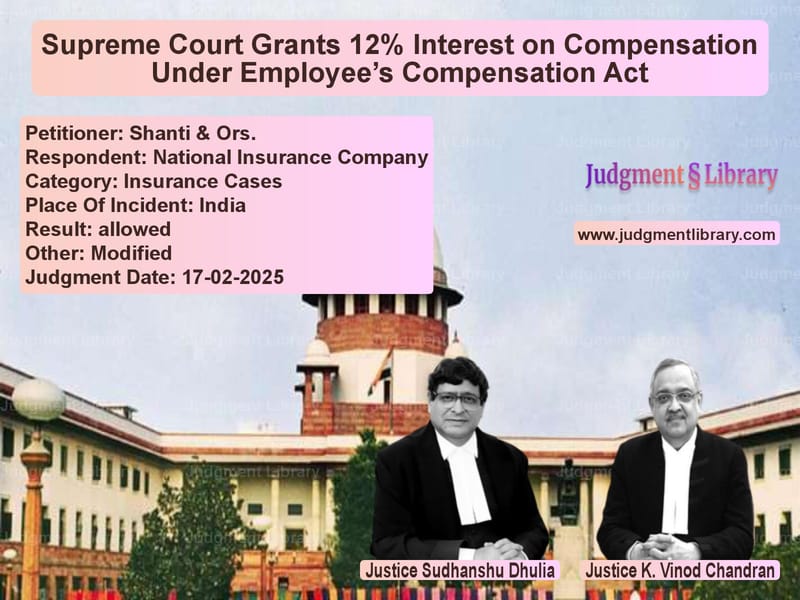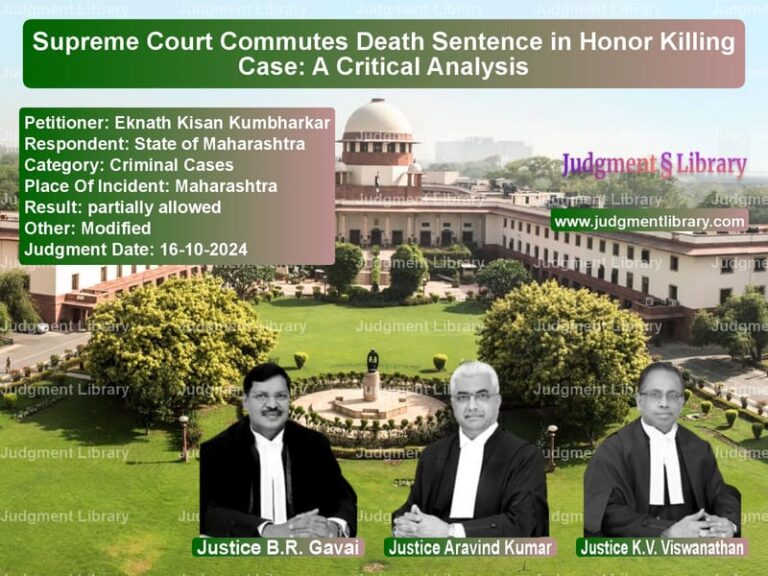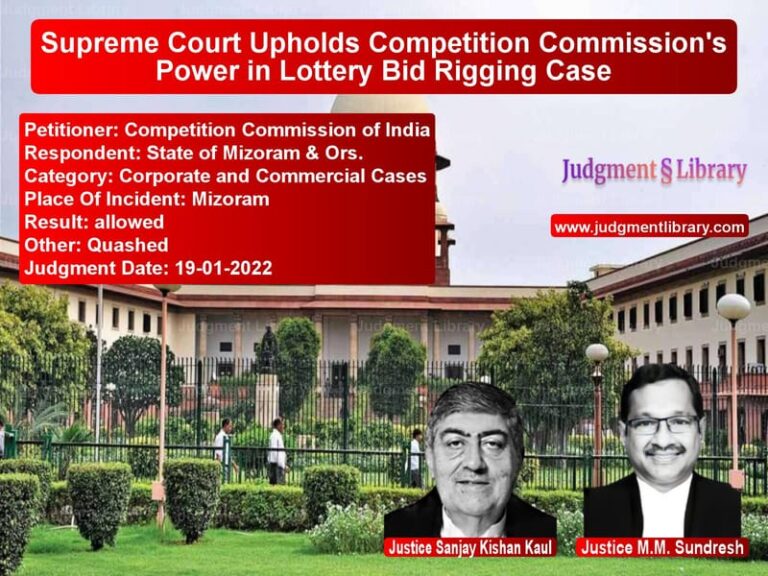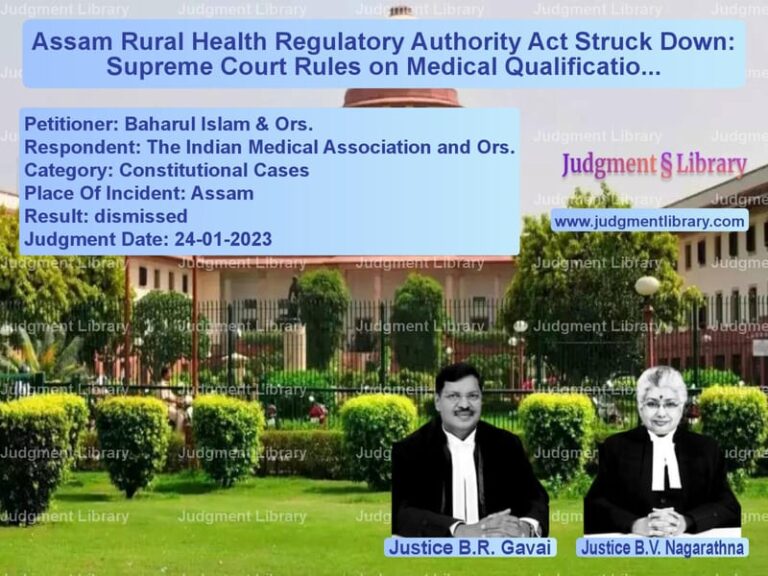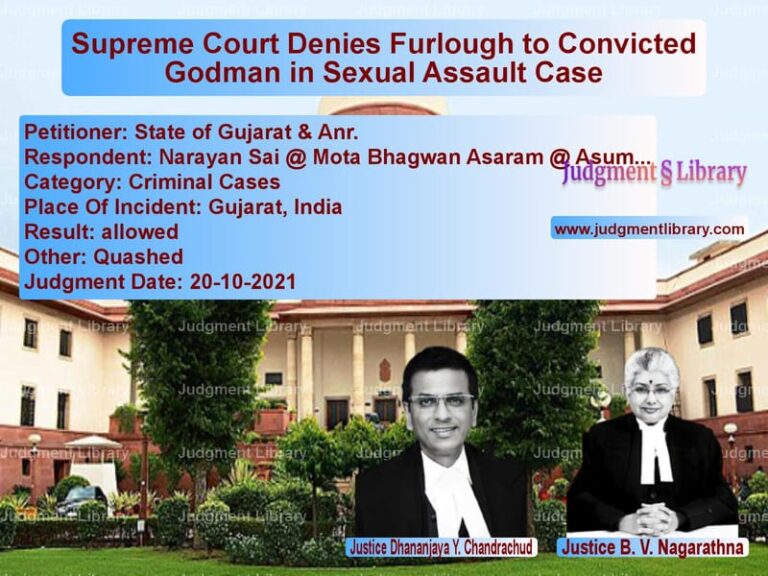Supreme Court Grants 12% Interest on Compensation Under Employee’s Compensation Act
The Supreme Court of India, in the case of Shanti & Ors. v. National Insurance Company, ruled in favor of granting 12% interest per annum on compensation awarded under the Employee’s Compensation Act, 1923. The ruling clarifies the liability of the insurer in cases of delayed compensation payments and reinforces the statutory mandate to compensate legal representatives of a deceased employee.
Background of the Case
The case involves a compensation claim under the Employee’s Compensation Act, 1923, filed by the family of a deceased truck cleaner who died in a work-related accident. The claim was initially disputed by the employer and the insurance company, leading to litigation.
The main legal issue before the Supreme Court was whether the insurance company should be held liable for paying interest on delayed compensation, or if such liability should fall solely on the employer.
Legal Issues Considered
- Whether the statutory interest of 12% per annum is mandatory under Section 4A(3) of the Employee’s Compensation Act.
- Whether an insurance company can be held liable to pay interest on delayed compensation payments.
- The extent of the insurer’s indemnity obligation when the employer defaults in making provisional payments.
Arguments Presented
Petitioner’s Arguments (Shanti & Ors.)
The appellants, representing the deceased employee’s family, contended:
- The insurance company, being a party to the proceedings, was liable to pay both compensation and interest as per the statutory provisions.
- Under Section 4A(3) of the Employee’s Compensation Act, interest on delayed payments is a statutory obligation and not discretionary.
- The Commissioner awarded compensation along with 6% interest, but the rate should be enhanced to 12% as mandated by law.
- The insurance company failed to make any provisional payments, thereby incurring an additional liability.
Respondent’s Arguments (National Insurance Company)
The insurance company opposed the appeal, arguing:
- The insurer is not liable to indemnify the employer for default in payment of compensation or failure to comply with the statutory mandate.
- There was no prior intimation of the accident to the insurance company, which absolves it from interest liability.
- The claim of the deceased being employed as a cleaner by his own father was questionable, raising doubts about employer-employee relationship.
- If liability is imposed, the insurer should have the right to recover the interest amount from the employer.
Supreme Court’s Observations and Judgment
The Supreme Court held that interest on delayed compensation is a statutory right and not subject to discretion. The Court made the following key observations:
- “The interest liability under Section 4A(3) arises due to the employer’s failure to make compensation payments within one month of the due date.”
- “The statute mandates that compensation must be paid with 12% interest per annum if delayed.”
- “The insurance company was a party to the claim and is liable to pay interest unless specifically excluded by policy terms.”
- “The discretion under the Act is limited to awarding a higher rate of interest, but 12% is the baseline statutory requirement.”
Final Judgment
The Supreme Court ruled:
- The employer was in default of statutory obligations under the Employee’s Compensation Act.
- The interest rate on compensation was increased from 6% to 12% per annum, effective from the date of the accident.
- The insurance company was held liable to pay both compensation and interest.
- The insurer was not entitled to recover the interest amount from the employer.
Impact of the Judgment
This ruling has significant implications for employment and insurance law:
- Clarity on statutory interest: Reinforces that interest on delayed compensation is mandatory.
- Insurance company liability: Establishes that insurers cannot escape responsibility for interest unless explicitly excluded.
- Ensures timely compensation: Encourages employers and insurers to process claims promptly.
Conclusion
The Supreme Court’s decision in Shanti & Ors. v. National Insurance Company upholds the statutory right of workers and their families to receive full compensation, including interest for delays. By reinforcing employer and insurer accountability, the judgment ensures that financial relief reaches dependents of deceased workers without unnecessary legal battles.
Petitioner Name: Shanti & Ors..Respondent Name: National Insurance Company.Judgment By: Justice Sudhanshu Dhulia, Justice K. Vinod Chandran.Place Of Incident: India.Judgment Date: 17-02-2025.
Don’t miss out on the full details! Download the complete judgment in PDF format below and gain valuable insights instantly!
Download Judgment: shanti-&-ors.-vs-national-insurance-c-supreme-court-of-india-judgment-dated-17-02-2025.pdf
Directly Download Judgment: Directly download this Judgment
See all petitions in Life Insurance Claims
See all petitions in Compensation Disputes
See all petitions in Judgment by Sudhanshu Dhulia
See all petitions in Judgment by K. Vinod Chandran
See all petitions in allowed
See all petitions in Modified
See all petitions in supreme court of India judgments February 2025
See all petitions in 2025 judgments
See all posts in Insurance Cases Category
See all allowed petitions in Insurance Cases Category
See all Dismissed petitions in Insurance Cases Category
See all partially allowed petitions in Insurance Cases Category

